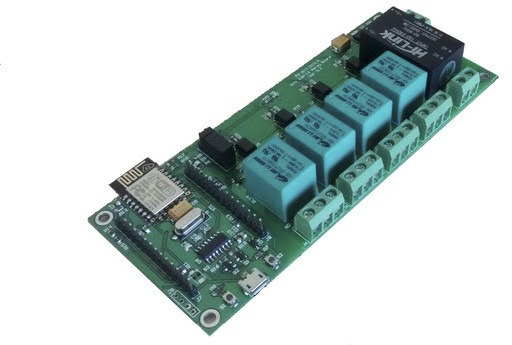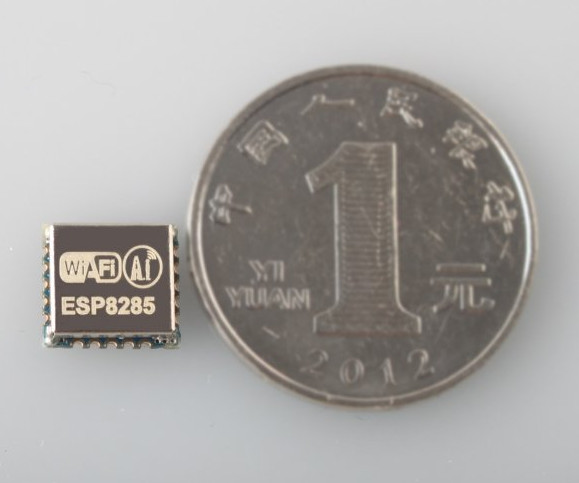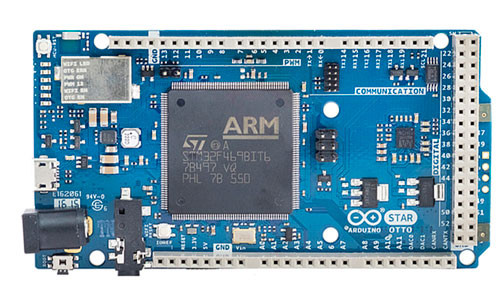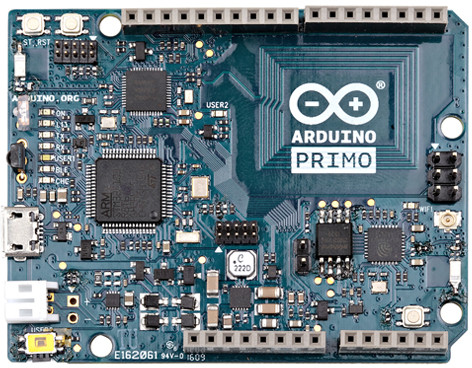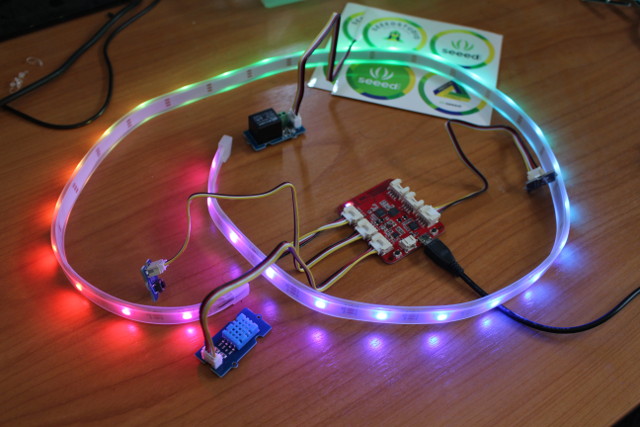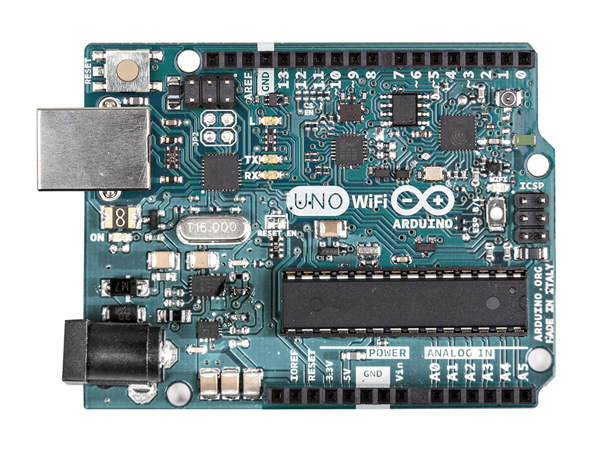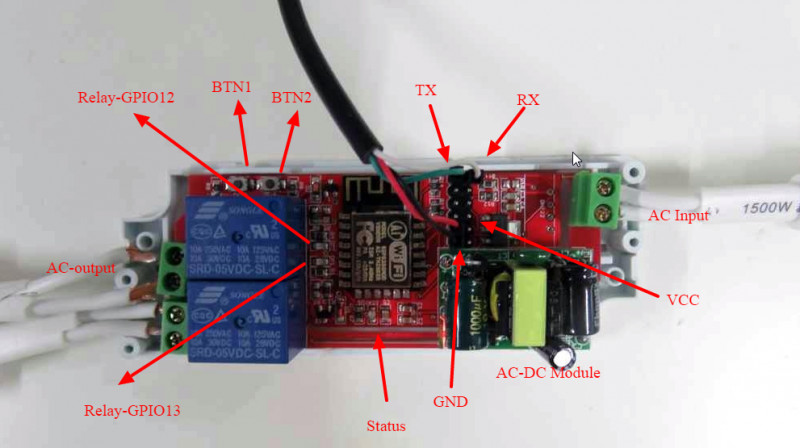Armtronix, an Indian startup, has come to kickstarter to launch a quad relay board with an AC terminal based on ESP8266, and the company also offer a complete kit allowing you to build your own wireless power strip with the board. WiFi quad relay board specifications: Wireless module – ESP8266 module 4x Relays to connect four AC/DC loads with terminals offering both MO and NC options “ModeMCU” headers to connect additional sensors such as PIR, IR, Temperature, Humidity, Limit switch etc. USB – micro USB port for programming. Misc – LEDs Power Supply – Terminal with 100-240V AC to 5V DC converter. Dimensions – 145 x 60 x 22 mm. The WiFi Quad Relay Board can be programmed as “MQTT Client” for networking/home automation integration using Arduino IDE, and controlled/ setup with a smartphone running a web browser. Some code is already available on the company’s github account. The crowdfunding […]
Espressif ESP8285 is just like ESP8266 but with 1MB built-in Flash, and Designed for Wearables
Espressif announced ESP8285 WiFi SoC was entering production last March. The new processor is based on ESP8266, but the company added 1MB built-in flash to make the solution smaller, and more suitable to wearables such as smartwatches and activity trackers. ESP8285 features a Tensilica L106 32-bit MCU and another ultra-low-power 16-bit RISC core, as well as 802.11 b/g/n/d/e/i/k/r WiFi connectivity. AI Thinker has already produced a tiny module based on the solution, called ESP-8285, and another person has developed an ESP8285 development board sold on Tindie for $24.95, and with some code sample (Arduino sketches) on Github. You’ll also find some more technical information on a Devacron blog post, or inside the datasheet on Espressif website. Via Hackaday Jean-Luc Aufranc (CNXSoft)Jean-Luc started CNX Software in 2010 as a part-time endeavor, before quitting his job as a software engineering manager, and starting to write daily news, and reviews full time later […]
STAR OTTO Arduino Board is Based on STMicro STM32 32-bit Cortex-M4 MCU & ESP8266 WiFi SoC
Thanks to STMDuino32 community, there was already support for the Arduino IDE on board based on STMicro STM32 ARM Cortex-M micro-controllers, but STMicroelectronics and Arduino Srl have introduced the STAR program to bring official support, and unveiled their first board with STAR OTTO Arduino board powered by STM32F469 Cortex M4 MCU at Maker Faire Bay Area 2016. Key features of STAR OTTO board (ARD-OTTO-STM32): MCU – STMicro STM32F469BIT6 ARM Cortex-M4 MCU @ 180 MHz with 2 MB Flash memory, 384 KB SRAM, Chrom-ART graphics accelerator System Memory – 16 MB SDRAM Storage – 128 KB EEPROM, microSD slot Connectivity – Wi-Fi 802.11b/g/n @ 2.4 GHz via Espressif ESP8266 Display I/F – MIPI DSI display interface Camera – Camera connector Audio – 2x MEMS digital microphones, headphone and speaker output USB – 1x micro USB host interface Expansion – Arduino Uno, Due, Mega connectors including 8x ADC, 2x DAC, 32 digital […]
Arduino Primo Board Supports WiFi, Bluetooth LE, and NFC
A couple of weeks after unveiling Arduino UNO WiFi with ESP8266 and Atmel AVR, Arduino Srl has introduced Arduino PRIMO board with Nordic Semi nRF52 MCU with Bluetooth Smart and NFC, ESP8266 for WiFi, and STM32 to handle GPIOs and USB UART during May Faire Bay Area 2016. Arduino Primo board (A000135) specifications: Service Micro-controller STMicro STM32F103R8T6 ARM Cortex-M3 MCU @ 72 MHz with 64KB flash, 20KB SRAM USB/Uart converter & CMSIS-DAP GPIO expander, IrDA Board power management Operating Voltage – 2.0 to 3.6 V Arduino Micro-controller Nordic nRF52832 ARM Cortex-M4F MCU @ 64 MHz with 512 KB flash, 64KB SRAM Analog I/O Pins – 6 + 1 DAC DC Current per I/O Pins – 7 mA Bluetooth Smart – Up to +4 dBm output power, -96 dBm sensitivity Other features – PDM interface, AES HW enc, NFC tag WiFi Micro-controller Espressif ESP8266 Tensilica Xtensa LX106 WiSoC @ 80 MHz […]
Programming ESP8266 Boards with a Smartphone
In recent days, I wrote about low cost MCU boards such as the $2 BluePill, and the One Dollar Board project, but several people commented that while the board themselves are very cheap, it might still be a problem in some developing countries, where access to computers cannot be taken for granted. So person suggested that such initiative would work better in some countries if programming was possible via a smartphone instead. Is that true? According to a 2014/2015 study by Pew Research Center, there is some truth to it, but it varies greatly between countries. For example, 55% of Brazilian adults own a computer at home, while only 24% own a smartphone, but in Kenya only 8% own a computer at home, while 15% own a smartphone. Some devices in the “cellphones but not smartphones” might be feature phones with WiFi and a web browser. Anyway ideally a low […]
Getting Started with Wio Link Starter Kit, Visual Programming Android App, and IFTTT
Wio Link is a board based on ESP8266 WiSoC that is supposed to be easy to set up thanks to Grove modules – no breadboard and mesh or wires – and, as I first understood it, to program thanks to a drag-and-drop mobile app that does not require any actual programming. More advanced users can also use a RESTful API in Python, JavaScript, Node.js, PHP, Objective-C or Java. I’ve been sent a $49 Wio Link Starter Kit including the board, a USB cable, and six Grove modules to evaluate the kit. I’ll start by having a look a the kit, before experimenting with the Wio Link Android app. Wio Link Starter Kit Unboxing The kit is sent in a red plastic case. Wio Link board is lodged in the top cover, and other accessories are placed in bags in the main part of the case. Let’s check the board first. […]
Arduino UNO WiFi Board Combines Atmel ATmega328P MCU with ESP8266 SoC
Arduino.org (Arduino Srl) has launched Arduino UNO WiFi board, bringing Arduino (Atmel ATMega328P MCU) and ESP8266 together, and adding WiFi to the popular Arduino UNO board, while keeping all existing interfaces and headers. Arduino UNO WiFi (A000133) board specifications: Arduino part MCU – Atmel ATmega328 8-bit AVR MCU @ 16 MHz with 32 KB flash Memory, 2KB SRAM, 1KB EEPROM Digital I/O pins – 14, with 6 PWM and UART Analog Input Pins – 6 DC Current per I/0 – 40 mA Misc – Reset button Operating Voltage – 5 V ESP8266 part SoC – Expressif ESP8266EX Tensilica Xtensa LX106 processor @ 80 MHz Storage – 4MB SPI flash Connectivity – 802.11 b/g/n WiFi @ 2.4 GHz, wake up time < 2 ms; Antenna: PCB and IPX Misc – Bootloader button, WiFi LED Operating Voltage – 3.3 V Common specs USB – 1x USB device port Input Voltage – 5-12 […]
Electrodragon WiFi IoT Relay Includes ESP8266 Module, AC Power, and Enclosure for $6
Thanks to ESP8266, the cost of WiFi relays has dramatically come down, but so far, I could not find an all-in-one solution with ESP8266, relay, AC power and enclosure, and for example I’m still using NodeMCU board, a relay board, a USB power supply, and put all that into a plastic jar in order to control a water pump. It works but it’s not ideal, and solutions like Wemos D1 mini with relay shield improves things further, but Electrodragon has come with a connect-and-play WiFi IoT relay that integrates everything including the case for $6 + shipping. Wifi IoT Relay Board Based on ESP8266: WiFi module – ESP-12F based on Espressif ESP8266EX WiSoC Relays – 2x Songle SRD-05VDC-SL-C relays supporting 125VAC/10A, 250VAC/10A, 30VDC/10A, 28VDC/10A Input/Output – 3x terminal blocks for relay and power Expansion – 12-pin header with Rx/Tx, GPIO4, Btn2, GPIO15, 5V/GND, ADC, GPIO5, Btn1, OUTPUT1, and 3V3 Debugging […]


